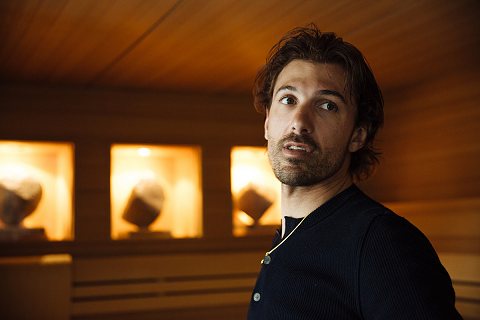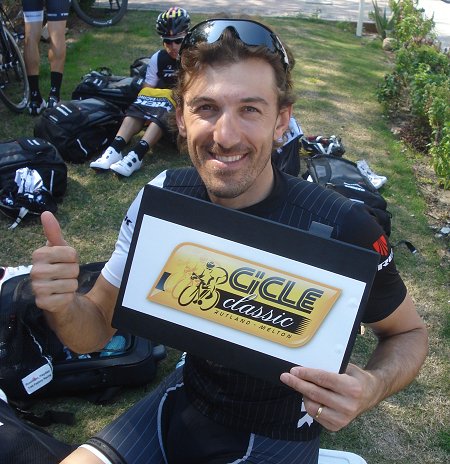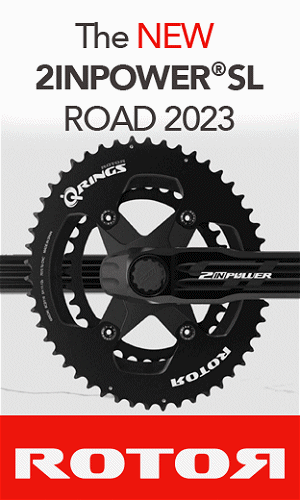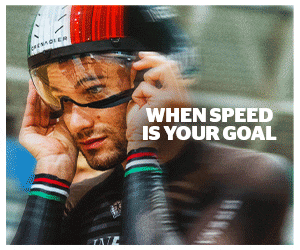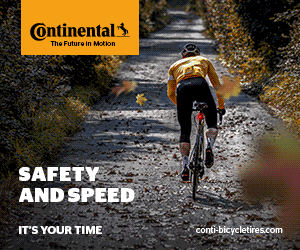Trek Factory racing’s Tim Vanderjeugd visits Fabian Cancellara at home for a Behind the Stripes series on the team’s website
 |
Feature – Fabian Cancellara at Home
In the inbox today was the following from Trek Factory Racing:Â Photographer Emily Maye and press officer Tim Vanderjeugd are on a mission to visit the TFR riders in their home environment and give the team’s fans a context outside of a competition.Â
Fabian Cancellara: Photo -Â Emily Maye
As Spartacus charges into comeback mode, Emily Maye and I visit him at his home in Bern, Switzerland. It’s an unexampled feature. Ironically, I am normally sheltering Fabian’s private life and delivering the following message to media: ‘I’m sorry, but Fabian prefers not to do an interview at his home.â€
Fabian Cancellara is no ordinary rider. Not if you measure his talent, his ambition or focus, and most definitely not if you look at his palmarès. Yet, we are not visiting the myth, or the legend. We visit a man who’s come to peace with his legacy and has found a balance between public and private life; a man whose Swissness has taken over the Italian half of his genetics, and someone with a meticulous desire to understand the weather system – a necessary skill for a bike rider in Switzerland as we will come to witness in the next days.
Fabian picks us up at the train station in Bern. He often sings high praise of the Schweizer Bahn and I must agree: the Swiss railway system is superb. The BEA, Bern’s annual exposition for agriculture and industry, is currently running and the city is a lot busier than usual.
“I’m not used to this kind of traffic,†he begins when he greets us. There’s no sign of any pain, as was the case the last time we saw each other face to face. That was the morning after he broke two vertebrae during E3 Harelbeke, forcing him out of Trek Factory Racing’s spring campaign.
“I have been pain-free since about a week. I still feel it after training, but it’s okay now. I didn’t ride my bike for three weeks. I was frustrated and bored, because there was nothing I could do. When you crash by your own mistake, you blame yourself. The circumstances of my crash are unclear, I don’t remember much, but there was nothing I could do.â€
“On the positive side, I learned my lesson in 2012 when I broke my collarbone in Flanders and then crashed myself out of the Olympic road race. The 2012 experience has helped me a lot to deal with this misfortune. My world came down then, this time it was different. Especially, because there was nothing I could do. There’s no surgery for vertebrae. I just had to wait until the pain was gone,†he says and shrugs his shoulders.
As we drive off, he outlines a scrupulously detailed plan for the first part of the day. To kick off, he’ll take us to Hinterkappelen, the town northwest of Bern where he grew up and where his parents still reside.
“The weather will get better from around 11:40 onward (Swiss meteorological precision!) so I’ll head out for training then. After that, we see.†It strikes me how he has the ability to plot a perfect storyboard for the entire morning, only to turn to mysterious vagueness afterward. This is not the first time I have witnessed this with Fabian. When it suits him he takes complete control, finicky to the smallest detail, and when it doesn’t, everything is ‘thrown to the wind’.
Curious, I ask him how his mind works regarding these matters: the constant shifts from extreme precision and focus to a lackadaisical stalling.
“Usually the period after Paris-Roubaix is always a busy time,†he explains. “A lot of decisions have been pushed back until after the Classics. Things are on hold and suddenly everything and everyone needs answers. In the same time, it’s when I try to decompress. For months, you prepare for those four weekends in a row where it’s all-in so you need a little time off with the family. Sort of the re-calibrate the compass, you know?â€
I find it adorable how he consistently mispronounces ‘know’ as ‘now’.
“This spring obviously was different because of my crash in E3. It was return to sender three weeks earlier than planned. The kids had holiday so we went to Bad Ragaz to get away from everything. I watched Flanders and Roubaix on the television. My off period started earlier, and everyone was really respecting the fact that I could hardly do anything with two broken vertebrae.â€
“But steadily decisions needed to be made. Before the season you set out some anchor points – the big races. Then you fill in the blanks on short and mid term basis: when to do certain interviews, when to schedule a photo shoot or a prototype test day with Trek, but also private things like when to throw a bachelor’s party for my best friend. There is so much, and the team has certain expectations of me too. Luca [Guercilena] expects me to show up ready at the races.â€
“If I take too much on my plate that’s not race related, my performance will suffer. That’s normal in life. But sometimes it’s not about tomorrow. Sometimes it’s about in four months.â€
Fabian is in full training mode for his scheduled comeback at the Tour des Fjords in Norway at the end of May. On a day like today, when the weather in a mountainous country like Switzerland is overcast and unpredictable, he’s like a plane in a holding pattern waiting permission to land.
He tells me he sometimes phones a friend in ‘this or that valley’ to decide on where his training ride will take him. He may ride out very early, or it may end up being much later in the day. It’s all weather dependent and he scrutinizes the webcam weather images over breakfast.
“We considered doing California or the Giro [d’Italia], but in the end I’ll restart in the Norway at the Fjords race. I’m happy the decision is taken. I don’t like it very much when things are in the air. I’m already in the air with the weather, trying to figure which way to ride out on training.â€
As we drive out of the city and cross the Nydegg Bridge over the Aare River he mentions the brown bears that live in a little zoo beneath, the famous tourist attraction, the Bärengraben (Bear Pit) of Bern.
The bear is Bern’s heraldic animal; you’ll find references to it everywhere, a symbol of both the city and surrounding canton and also featured in their coat of arms. Unfortunately, the bears are temporarily staying in a zoo in the French speaking part of Switzerland because of renovations to the BärenPark.
We head west and the road begins to quickly climb. This is where the final of stage 8 in the Tour de Suisse will be contested. If Fabian is back in prime shape by then, this could be his day – a stage in his backyard where he knows every bump and crevice in the road.
As we ascend an incredible view opens up revealing the Old City of Bern, a protected UNESCO World Heritage Site since 1983. It’s not hard to grasp how the river Aare forms a natural boundary for the city, making it an easily defendable peninsula.
“We’ll visit the old town tomorrow. You will like it!â€
Hinterkappelen is about twenty minutes away from the city. The young urban vibes that the university crowds and the government clerks bring to Bern have not made it to the town of about 8,000 inhabitants where Fabian grew up. It’s a run-of-the-mill kind of place. Fairly average prose compared to the poetry of Old City Bern.
Fabian guides us around the town. He shows us the house where he spent the first six years of his life. He then drives around the block and points out a soccer field. “I helped install the lighting system for the field, can you imagine? When I was 16 I entered a school system where you would only come to school for classes one day a week. On the other four days you would work with an electrician or with a construction company and learn a skill. I studied electricity and the soccer field was one of the projects I worked at.â€
“Hinterkappelen has changed a lot,†he admits and then looks around in silence, perhaps contemplating how much his life has changed too.
“I remember the training rides I would do at night. I had my training loop, which was about 10 kilometers long and it included one hill. I would do laps and when it got dark I would have lights on my bike. Or my dad would drive behind me in the car with the big lights on.â€

Donato Cancellara is a remarkable character. At 67 years of age he’s bald and sports a little grey mustache and square reading glasses, but his solid build and his sneakers impart a measure of youthful athleticism. Fabian gives him a kiss when we arrive at the apartment. Fabian’s mom, Rosa, is at the aqua gym.
Donato came over to Switzerland from the South of Italy when he was 18, in search of a better life. All he had was one suitcase. “There were no good prospects where I grew up. My family had a building company, but I wanted something different. I’m the second youngest of seven children. One of my siblings had already emigrated here, so I followed.â€
The Swiss taught him about discipline and hard work, he says. “In the beginning it was hard. The language, you know? I only spoke some French when I arrived. I had studied mechanics and I found a job in the air-conditioning and ventilation sector.â€
He leads us to a room that’s packed wall-to-wall with trophies, jerseys and boxes full of shoes, sunglasses and other memorabilia from Fabian’s storied career.
“I have collected everything along the way,†Fabian’s father points out. “What a ride it has been!â€
Fabian smiles then adds, “In the beginning you have no idea what lies ahead. The first trophies are literally unique. You don’t think that hundreds will follow, won at races that are a thousand times bigger than the first school race I won.â€
Donato looks at his son. He says nothing, but his expression reveals everything. It is obvious he’s an immensely proud father.
“It’s illegal not to stop,†Fabian explains when he slams the brakes at a pedestrian crossing on the way to his home in Ittigen. I don’t feel the need to tell him it’s the same in many non-Swiss countries.
Instead, I ask him if it’s harder for him to speak English when he’s been home for some time. “Yes,†he answers. “I definitely have to get used to it again. It’s the same when I come home after being on the road for a while; I need to get used to speaking German again.â€
Swiss German that is, a jollier dialect of German and quite a bit more difficult to understand. It’s very melodic and to me it sounds vibrant, almost playful. Later today I am surprised to find out Giuliana, Fabian’s oldest daughter, is speaking standard German. Before she would only speak Schwyzerdütsch, the native language, but in school she’s learning Hochdeutsch.
Fabian is a polyglot, like most Swiss and also most European pro cyclists. As his press officer, I find it incredibly interesting to compare the interviews he does in different languages. He’s usually very uninhibited in Italian, somewhat lukewarm in French and Spanish, analytic and esoteric in English, and superb in (Swiss) German.
Taylor Swift is playing through the speakers of his black BMW X6 M-series with a black leather dashboard and red stitching. In a blink of an eye we arrive in Ittigen, an affluent suburb of Bern. “I like that Bern is not too small and not too big. You can get around very easily.â€
I ask him about his current shape.
He replies: “It’s not really a matter of how much shape I lost. I find it hard to express that in percentages or something. More than anything it’s about the routine you lose. When I restarted training I was really tired after a 3,5 hours ride. The next day I did 4 hours and I was even more spent. So yeah, it’s a matter of getting used to the workload again.â€
And then he admits that these broken routines work both ways. “If you spend December to April practically entirely away, it feels weird to be home for longer than four days in a row. I need to get used to being home also. To being a husband and a father again, you know?â€
We drive under a pedestrian bridge that was named after Fabian when he won his first of two double Flanders-Roubaix victories in 2010. “It is a real honor that the town counsel did this for me,†he beams. “It’s also nice because I wasn’t raised in Ittigen. Maybe I’m the only bike rider in the whole WorldTour that has a bridge with his name! But all jokes aside, it’s not like they built the bridge for me. It was anonymous before they named it after me.â€
In part 2 of our home visit to Bern we discover how success changed Fabian, how he’s given pressure a place in his life, and how he’s found a balance between his private life and his job on two wheels.
FURTHER PARTS TO THE SERIES HEREÂ
Send your results as well as club, team & event news here
Other Results on VeloUK (including reports containing results)
- Features, Reports, Results
- TT Result: VTTA East Midlands 10m TT
- TT Result: East Sussex CA 25m TT
- TT Result: VTTA Kent 30m Time Trial
- TT Result: Shaftesbury CC 25m TT
- TT Result: CTT Classic Series 3
- TT Result: Diss & District CC 25m TT
- TT Result: Icknield RC 20m TT
- TT Result: Royal Albert CC 10m TT
- TT Result: Southport CC 15m TT
- Crit Result: Milton Keynes Development Races
- This weekend: 18th CiCLE Classic UCI 1.2
- The Dave Peck Memorial: British Women’s Team Cup 2
- BMCR RESULT: National A/B RR and Echelon Cycles Stallard races
- RR Result: PB Performance U23 Nat Series RR
- RR Result: Proper Northern Road Races (Oakenclough)
- RR Result: Drummond Trophy
- Crit Result: Thruxton Tuesday Series 2
- Crit Result: CDPP Sport Crit Series 1
- Crit Result: SACA Salt Ayre Series 1
- Crit Result: Portsmouth Evening Circuits 4
- Crit Result: Rowe & King Maindy 1
- Q&A: Charlie Abraham (Lee Valley Youth Junior Cycling Team)
- Events: SSSCCRRL Road Race League
- Youth Result: Isle of Man Youth League
- Youth Result: Lawford Youth Series (Curborough) #2
- Crit Result: Full Gas Summer Circuit Series #2
- Crit Result: Ride Flux Spring Crit series #2
- Youth Result: Maindy Flyers Freewheel League 1
- Ribble Collective: Ride More in ’24
- Crit Result: Tameside Cycling Development Circuit Races 1
- Crit Result: 2024 West Thames League 1
- Startlist: The Drummond Trophy
- TT Result: VTTA Surrey/Sussex 10 mile TT
- EVENTS: Proper Northern Road Races – Round 2 Oakenclough
- TTT Result: Scorton TTT
- TT Result: Manchester & District TTA 25m TT
- TT Result: Stowmarket & District CC 15m TT
- TT Result: Paceline RT Sporting TT
- TT Result: Hereford & District Wheelers 25m TT
- RR Result: Yorkshire RRL #1
Other News on VeloUK
- This weekend: 18th CiCLE Classic UCI 1.2
- Events: SSSCCRRL Road Race League
- Ribble Collective: Ride More in ’24
- Startlist: The Drummond Trophy
- EVENTS: Proper Northern Road Races – Round 2 Oakenclough
- Events: Dave Peck Memorial
- News: Women’s Tour of Britain
- Startlist: PB Performance Espoirs Road Race
- East Cleveland Classic: Saint Piran Team
- News: New kit for Ribble Rebellion Riders
- Events: Halesowen Friday Track Nights
- Team News: Ribble Rebellion off to the USA
- News: Pedal Club Lunch (March)
- Rider News: Winning start for Billy Ladle
- News: CiCLE Classic 2024
- Startlist: Stars of the SW Men’s U23 RR
- Startlist: Danum Trophy 2024 (Nat B)
- Startlists: London Dynamo Road Races
- Startlist: La Fleche Waltonne Road Races (BMCR)
- Meet Ribble HoloRider
- Startlists: East Cleveland Classic 2024
- Former Winners: Lincoln Grand Prix
- Chris Lawless Joins Saint Piran Team
- Paracycling Track Worlds Day 4
- Para CyclingWorlds Final Day
- Startlist: National Youth Circuit Series Rd 1
- Report/Result: Azets Spring Classic
- Startlists: RCR Fat Creations Road Races
- Startlist: Capernwray Road Race (March 31)
- Team Report: Fensham Howes MAS Design Junior Team
- Team Report: CiCLE Classic Junior Men
- RIDER REPORTS – Zoe Parker (Solihull CC)
- GB News: Two World Titles for GB at Para Worlds
- Team News: Alba Development Road Team
- News: British Road Champs Return to NE
- THIS WEEKEND: Peaks Two Day is Back!
- News: Laura Kenny Retires
- Team News: Lee Valley Youth Cycling Team
- 2024/25 CYCLO-CROSS CALENDAR
- Startlist: Cardiff Ajax CC 10 Mile TT






